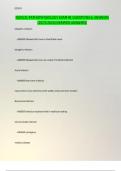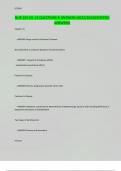Nur 145 - Study guides, Class notes & Summaries
Looking for the best study guides, study notes and summaries about Nur 145? On this page you'll find 396 study documents about Nur 145.
Page 4 out of 396 results
Sort by
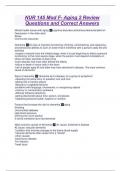
-
NUR 145 Mod F- Aging 2 Review Questions and Correct Answers
- Exam (elaborations) • 6 pages • 2024
- Available in package deal
-
- $8.99
- + learn more
Mental health issues with aging cognitive disorders-alzheimers/dementia/delirium Depression in the older adult Abuse Community resources Dementia the loss of cognitive functioning--thinking, remembering, and reasoning--and behavioral abilities to such an extent that it interferes with a persons daily life and activities -ranges in severity from the mildest stage, when it is just beginning to affect a persons functioning, to the most severe stage, when the person must depend completely on others...
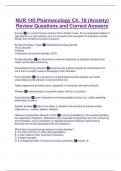
-
NUR 145 Pharmacology Ch. 16 (Anxiety) Review Questions and Correct Answers
- Exam (elaborations) • 7 pages • 2024
- Available in package deal
-
- $8.99
- + learn more
Anxiety is a normal human emotion that is similar to fear. It's an unpleasant feeling of apprehension or nervousness, and it is caused by the perception of potential or actual danger that threatens a person's security. Anxiety Disorders: Types -Generalized anxiety disorder -Panic disorder -Phobias -Obsessive-compulsive disorder (OCD) Anxiety disorders are abnormal or irrational responses to stressful situations that impair normal daily functioning. Generalized anxiety disorder excessive wor...
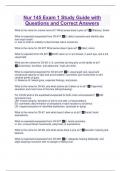
-
Nur 145 Exam 1 Study Guide with Questions and Correct Answers
- Exam (elaborations) • 6 pages • 2024
- Available in package deal
-
- $8.99
- + learn more
What is the name for cranial nerve #1? What sense does it give us? Olfactory; Smell. What is expected/unexpected from CN #1? E- able to perceive and identify odor from each nostril. U- loss of smell or inability to discriminate odors (anosmia). What is the name for CN #2? What sense does it give us? Optic; vision. What is expected from CN #2? 20/20 vision w/ or w/o lenses, in each eye, and a full visual field. What are the names for CN #3, 4, 6, and what do they give us the ability to do? Oc...
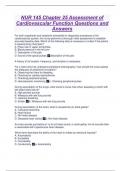
-
NUR 145 Chapter 25 Assessment of Cardiovascular Function Questions and Answers
- Exam (elaborations) • 7 pages • 2024
- Available in package deal
-
- $8.99
- + learn more
For both outpatients and inpatients scheduled for diagnostic procedures of the cardiovascular system, the nurse performs a thorough initial assessment to establish accurate baseline data. Which of the following data is necessary to collect if the patient is experiencing chest pain? A. Pulse rate in upper extremities B. Blood pressure in the left arm C. Description of the pain D. Sound of the apical pulses description of the pain A history of its location, frequency, and duration is necessary. ...
NR 341, NSG 318, NUR 145 , NUR 172 EXAMS PACKAGE DEAL ALL CHAPTERS FOR THE ACTUAL TEST
NUR 145 CH. 15 QUESTIONS & ANSWERS (2023/2024)(VERIFIED ANSWERS)
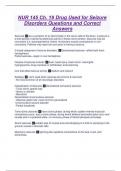
-
NUR 145 Ch. 19 Drug Used for Seizure Disorders Questions and Correct Answers
- Exam (elaborations) • 6 pages • 2024
- Available in package deal
-
- $8.99
- + learn more
Seizures are a symptom of an abnormality in the nerve cells of the brain. A seizure is a brief period of abnormal electrical activity in these nerve centers. Seizures may be convulsive (i.e. accompanied by violent, involuntary muscle contractions) or non-convulsive. Patients may report an aura prior to having a seizure. 2 broad categories of seizure disorders: Generalized seizures—affect both brain hemispheres Partial seizures—begin in one hemisphere Causes of seizures include: fever, head...
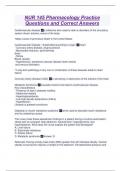
-
NUR 145 Pharmacology Practice Questions and Correct Answers
- Exam (elaborations) • 5 pages • 2024
- Available in package deal
-
- $8.99
- + learn more
Cardiovascular disease a collective term used to refer to disorders of the circulatory system (heart, arteries, veins) of the body. *Major cause of premature death in the United States. Cardiovascular Disease - Subdivided according to organ Heart -Coronary artery disease, angina pectoris -Myocardial infarction, dysrhythmias Brain -Stroke Blood vessels -Hypertension, peripheral vascular disease (both arterial and venous disorders) **Long-term pathology of any one or combination of these diseas...
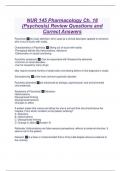
-
NUR 145 Pharmacology Ch. 18 (Psychosis) Review Questions and Correct Answers
- Exam (elaborations) • 6 pages • 2024
- Available in package deal
-
- $8.99
- + learn more
Psychosis No exact definition; term used as a clinical descriptor applied to someone who is out of touch with reality. Characteristics of Psychosis -Being out of touch with reality -Perceptual deficits like hallucinations, delusions -Deterioration in social functioning Psychotic symptoms -Can be associated with illnesses like dementia -Common in mood disorders -Can be caused by many drugs May require several months of observation and testing before a final diagnosis is made. Schizophrenia is...
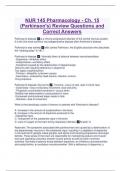
-
NUR 145 Pharmacology - Ch. 15 (Parkinson's) Review Questions and Correct Answers
- Exam (elaborations) • 6 pages • 2024
- Available in package deal
-
- $8.99
- + learn more
Parkinson's disease is a chronic progressive disorder of the central nervous system. It is the 2nd most common neurodegenerative disease after Alzheimer's disease Parkinson's was named after James Parkinson, the English physician who described the "shaking palsy" in 1817. Parkinson's disease - Normally there is balance between neurotransmitters -Dopamine—inhibitory effect -Acetylcholine—excitatory effect - Symptoms caused by the deterioration of dopaminergic Neurons with resulting de...

That summary you just bought made someone very happy. Also get paid weekly? Sell your study resources on Stuvia! Discover all about earning on Stuvia

